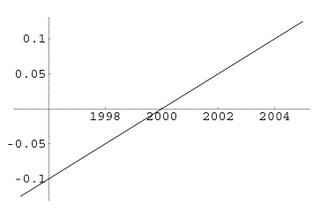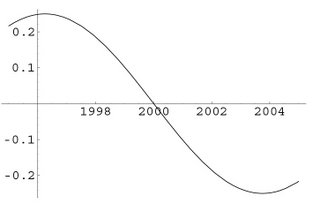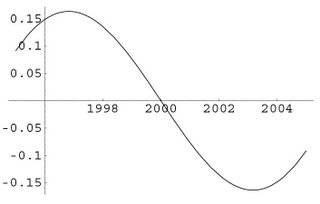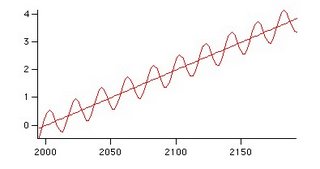1998 was a blistering hot year, caused primarily by an enormous El Nino that year. 2005 was hot, too, and while some claim it was hotter than '98, my view is that it was a statistical tie.
Does this mean that global warming stopped in '98? (as argued in places like this) The answer is no. To illustrate, let's consider some synthetic data I made up.
First, let's assume that the human contribution to globally averaged temperatures looks like this:

This is 0.2 deg C per decade, similar to measurements over the past few decades. But as we all know, other things also affect our climate. A particularly good example is El Nino. During an El Nino, the globe warms considerably compared to non-El Nino years. El Nino's occur every few years, so let's assume that El Nino's contribution to global temperature looks like this:

Now let's sum them.

As one can see, the El Nino signal in our little example (and in reality) totally dominates the human-induced signal.
So if one wants to know how much "global warming" has occurred since 1998, one has to subtract out the influence of El Nino. If one does that, then 2005 is much hotter than 1998, and global warming is alive and well.
The important lesson to learn here is one of time scales. Looking at the temperatures from 1998 to 2005 means you have about 8 years of data. This is comparable to the El Nino cycle time. If one looked at much longer times (e.g., a few hundred years), the effect of El Nino would be less important and more obvious. To illustrate that, here's the same two time series extended out 200 years.
 As you can see, the upward 0.2 deg per decade signal is quite obvious in this plot.
As you can see, the upward 0.2 deg per decade signal is quite obvious in this plot.The same is true if the time series is much shorter than the time scale of the variation. That's why we don't have to worry about ice age/interglacial variations in our analysis of the warming of this century. But by picking a time scale that is comparable, it maximizes the confounding effects on any trend calculation.
People who argue that global warming stopped in 1998 are 1) clever advocates who are willing to mislead to win the argument or 2) don't understand much about the climate system.
15 comments:
Dr. D,
I am not saying this to try to argue against GW or human contributions to AGW or anything, but I am just genuinely curious. Given what you have just said about selective timescales, why do most pro-AGW scientists routinely point to temperatures around 1870 or so and illustrate the warming trend since then, when it would appear that the planet was significantly warmer around 1840 or so? Aren't they guilty of the same kind of distortion of the data through selective timescale choices? Again, I am not asking the question for the purpose of denying GW or AGW, I am simply curious why selecting the period 1870-present for comparison is different than selecting the period 1998-2005. Each shows the trend that one side or the other is championing, but neither time period starts during what could be considered "baseline" conditions. I know there is no true climate "baseline", but picking a starting point when temperatures may be anomalously low or high compared to a previous period is biasing the trend in either case.
Bill-
I don't think there's any evidence that the planet was much warmer in the early 19th century than it was in the mid/late 19th century. Rather, I think just about everyone agrees the Earth has been warming for at least 400 years --- since the end of the little ice age. Let me know if there's some evidence in particular you're referring to.
As far as the 1860-ish cut-off, I'm pretty sure that is dictated by data availability, not a choice made by scientists. There just aren't enough stations that go back in the early 19th century to produce a global average.
Regards
The point about how far back instrumental records go was dealt with in detail in the first two Mann Bradley and Hughes papers. Not only must there be a reasonable number of stations, but they must be distributed across the globe. It is also important that they use the same protocols, or one will have to correct for that factor.
Given those explanations, how do you two feel about Hansen's latest outbursts given that his evidence for his claims appears to be limited to the comparison of data from one ODP hole to recent instrumental data with no justification or correction for correlation of the data? I am sure this is more of the quibbling that you feel distracts from discussion of the real issues of AGW Dr. D, but I can't see how the actions of MBH with regard to scientific transparency and Hansen with regard to the mixing of politics and science go uncommented on while you criticise others for using selective timescales and other flawed methods.
Bill-
I haven't read the Hansen paper yet, so I cannot comment on it. And I agree (and actually did comment) that scientists that don't share data and code with others makes us all look bad.
Regards
Andrew, Bill is throwing spaghetti against the wall hoping something will stick. Your responses only encourage him. His tactics are well known to most three year olds, ask a question, and then if you don't like the answer, ask three more.
As to sharing data, I think both of you are operating on a very pretentious level. The papers that I write describe work that I have done. My papers allow you to replicate the work IF you have sufficient skill and resources. It has taken me many years to acquire that skill and level of resources. What is my obligation to hold your hand at no cost in time and money to you?
The "data" that I have acquired and is described in the papers that I publish, are often the next step to further work. What is my obligation to provide that data to those who are competing with me or would kind of like to?
Finally (well maybe not), I produce materials which I describe in my publications. What is my obligation to provide those materials to others on demand?
These are but some of the issues surrounding sharing of data and code. They are serious issues which in blogs are dealt with at the level of pious cant, but in the real world of science fiction require practical and not absolute answers.
Eli-
I see your point and agree that you're under no *obligation* to provide any aid beyond what's in the publication to anyone. That said, my view is that unless you have a really good reason *not* to provide the code or data, you really should. This is a value judgment that's based on the fact that I've asked people for code and they've kindly provided it, and people have asked me for code and I've provided it. It's not a big deal. I can't think of a single reason why I should not provide code/data to any interested party that requests it (after I've published it, of course).
Regards
Eli,
I am not throwing anything against a wall. I think Dr. D has a nice balanced viewpoint on both the state of the science of AGW and the need for care in applying that science to the political decision making process. I may disagree at times with his position on things, but I greatly appreciate that he is willing to discuss what we do and don't know and isn't arrogant enough to believe that we know everything there is to know. That same balance is quite lacking in many AGW proponents and attempts to stifle discussions are commonplace among people who would rather we all just bowed to their wisdom instead of asking questions about the little man behind the curtain. In this case, Dr. D made a good point about selective use of data to produce a biased picture or reality. In response to your comment about combining dissimilar datasets, I asked about MBH and Hansen, who have been accused of doing exactly that without justifying the methods they used and/or without making the raw data available so that their experiments could be reproduced.
It is one thing if you are doing what you do purely for the sake of the science involved, to say that if one is interested in the science that they should educate themselves enough to figure out what you are doing, without needing handholding and personalized education. However, people like MBH and Hansen are using their research to try to make the case for a GLOBAL change in habits and policy by several BILLION people, most of whom are not climate scientists. In that regard, I think they owe it to all of us to be as transparent and as open as possible in providing their raw data, code, and any other explanation necessary to make it ABSOLUTELY clear to any interested party, how they arrived at their conclusions.
What I really found interesting was your comment about "competition". You said:
"The "data" that I have acquired and is described in the papers that I publish, are often the next step to further work. What is my obligation to provide that data to those who are competing with me or would kind of like to?"
Do you work for a company that stands to profit from your research? Are you doing what you do to try to turn a profit? Or are you doing research to advance the scientific understanding of a given subject? The "competition" you speak of is EXACTLY what leads people to distrust research scientists. If you are working on a patent worthy invention, I can see where your interest in secrecy would be justified. But if you are an "independent" research scientist who is trying to further the understanding of a given subject for the good of society, your sense of competitiveness is misplaced. Yes, somebody may take the outcome of your research and build on it...but then you will have the opportunity to build off of what they do. If you are all truly working towards the same goal, which is furthering scientific knowledge, competitiveness has no place in the discussion.
Now with that said, I am not naive enough to think there isn't professional competition for stature in the scientific community...and I recognize that the best way to stifle criticism of your work is to make it hard on your critics to obtain your data or reproduce what you did...but there is a line between simple scientific competition and the deliberate withholding of crucial data and methodologies necessary to justify the findings of your research, when that research is being widely used to justify calls for global action (which is what MBH are doing).
My ability to support myself (university professors are only paid on a nine month basis if that), my collaborators and most importantly my students, is directly related to the value of the intellectual property that we produce.
This determines our ability to continue doing research.
The obligation to patent imposed by research grants and contracts as well as by universities and companies implies that intellectual property is not a total commons.
Publications and reports describe the work we have done on the basis I previously described, so that experienced people can replicate the results given appropriate resources.
Bill appears not to have read that sentence.
We also create unique materials and systems that can be used or studied by others. We usually provide those materials to others on a cost free basis with the understanding that we will be able to use the results of their studies in publications, either together, or separately. Another choice would be to charge for the materials.
I have collaborators, colleagues and competitors. I also have a number of people who would eat my cheese, and some others who have a huge resource base.
1. Clearly I will freely share with my collaborators and colleagues.
2. I share with competitors on a prisoners dilemma basis. A major part of this is to convert competitors into collaborators.
Andrew is sharing on the basis of 1 and 2.
3. If we come across something hot that a "superlab" wants to work on, we have a problem, because we cannot compete with them. In that case one tries to negotiate a collaboration.
Now tell me why I should freely share with someone who is out to steal our cheese or has a track record of distorting our results? (And yes, that is a subjective judgement on my part)
Why should my intellectual property be totally available on demand to anyone who wants it?
How much time do I have to spend providing information to others?
For complicated problems/large data sets, that can require a great deal of time. For example, what if someone wanted to go through the data on all the stations in the GISS surface temperature data base, and insisted on disputing every detailed correction and choice.
Eli-
First, I agree that one is not under a legal obligation to share data or code. And I'll agree that if it materially affects your research, you should not do it. However, in the absence of a compelling argument that it would harm a research effort, my view is that scientists should freely share unpublished aspects of their work. For example, I don't see how giving up his MBH98/99 code would impact Mann's research effort in the least.
Regards
That's only because the code sucked, and I speak as an original FORTRAN II programmer. It was the kind of programming that has given FORTRAN and ugly name. There really was no there there.
It was a trivial translation of the algorithm described in the papers and in that sense Mann was correct. You could write a much better program and many did so. The only real information you got from reading Mann's files were the input lists of the data file names and that was not the code.
Having had multiple headaches from reading graduate student programs, allow me to say that I can understand why someone with a few more years of experience would not like for others to look at that stuff. Elegant it was not.
If you want the recognition and benefits of having your research fidnings publicized through publication in a scientific journal, you should expect to be asked to provide enough data and information so that people can replicate your experiments. MBH have refused requests to do so, and that was the focus of my original question to Dr. D. I understand your dilemna Eli, but publication is a double edged sword. As I said before, a certain degree of secrecy is understandable for self preservation. However, at some point, in order to have your work taken seriously as a scientist, you have to provide enough information and your research needs to have sufficient transparency to allow others to duplicate your work and verify your results. MBH have refused to provide enough data to allow their work to be duplicated, and as such, the climate science community should be scorning them instead of continuing to defend them.
Again:
The papers that I write describe work that I have done. My papers allow you to replicate the work IF you have sufficient skill and resources.
Bill appears not to have read that sentence again.
The only reason people try and DUPLICATE work is to get to the starting point for their own nefarious or not purposes. Duplicated work is not publishable (ok, there are a few journals....)
It is not the job of anyone to hold your hand. You don't have the right to anyone's progamming code, the paper must fully describe the algorithm used. If the data has been published elsewhere, or is available elsewhere, and this is noted in the paper or well known in the field, you cannot demand the data from the authors. They should remind you where you can get the data.
A great deal of the hoo hah about MBH(* started because McIntyre and McKitrick kept bugging Mann for more and more, Mann instead of telling them to go suck at the NOAA paleoarchive where most of the data was gave the job of putting the data together to a grad student, who obviously thought the thing was an imposition. The grad student made some transpositions upon which the good doctors M&M sprung like hungry lambs. No good deed goes unpunished.
Which again is why the first rule of dealing with strangers and competitors is to play by prisoner's dilemma rules.
Now Andrew and I might appear to differ on all this, but I strongly suspect that is because I have thought about the issue over many years. In essence he is sharing, but has not (yet) been ripped off.
Again...if you YOU read what I am saying, I am not arguing what YOUR obligation should be! If you want to publish for the greater glory of yourself and choose not to try to help others understand what you are doing...FINE! However, if you are publishing new research and then using it (ala Hansen) to trumpet your demand that the entire world population radically change their entire lifestyle within the next ten years or risk forever changing the fate of their offspring...then I think there is a different level of effort and standard of sharing that you should be held to. For example, if Dr. D wanted to win the mythical "climate scientist of the year" award, then he needs to release enough data and information with his research so that other climate scientists can understand what he is doing and if desired, try to reproduce it. However, if he is testifying before the senate using his research to support changes in environmental and economic policy that will affect every person in the country, then his level of documentation and transparency is and should be MUCH higher. Guys like Mann and Hansen are trying to use their findings to bring about dramatic changes in the lives of every human on the planet, so I think in their situation, your concerns about scientific competition are insignificant in the face of the much larger responsibility to do whatever is necessary to make it absolutely clear that they are not toying with numbers while hiding behind "proprietary code" to bring about a predetermined outcome to justify their position
BTW, the reason to duplicate work isn't just to build off of it, it is also to backcheck it and see if it was done properly in the first place. If somebody comes to a conclusion that differs from the conclusions of your own work, it is simply good science to try to duplicate their efforts, applying your own knowledge and expertise to see if you reach the same result. If the original researcher refuses to release enough information to allow their work to be fully duplicated, then other scientists are fully justified in questioning the validity of their results.
I you think Hansen hasn't crossed the line from scientific to political with his most recent efforts, then I would question your ability to discern any line between the two.
Post a Comment